|
|
 |
Fiche d'espèce de Copépode |
|
|
Cyclopoida ( Ordre ) |
|
|
|
Corycaeidae ( Famille ) |
|
|
|
Farranula ( Genre ) |
|
|
| |
Farranula curta (Farran, 1911) (F,M) | |
| | | | | | | Syn.: | Corycella curta Farran, 1911 a (p.286, figs.F,M); Farran, 1936 a (p.139); Zavodnik, 1961 (p.70); De Decker, 1964 (p.15, 21, 29); De Decker & Mombeck, 1964 (p.12); Delalo, 1968 (p.139); Kovalev & Shmeleva, 1982 (p.86);
Non Corycaeus (Corycella) curtus : M. Dahl, 1912 (p.113, figs.F,M);
? Corycaeus (Corycella) curtus : Früchtl, 1923 a (p.156); Sewell, 1948 (p.393); Tanaka, 1960 (p.88, fig.F, Rem.); Vilela, 1965 (p.16); Binet & Dessier, 1968 (p.11); Frontier, 1977 a (p.18);
Corycaeus curtus : Furuhashi, 1961 a (p.110); Kovalev & Shmeleva, 1982 (p.86) | | | | Ref.: | | | Vilela, 1968 (p.41, Rem.); Dawson & Knatz, 1980 (p.10, figs.F,M); Bradford-Grieve & al., 1999 (p.888, 975, figs.F,M); Conway & al., 2003 (p.260, figs.F,M, Rem.) ;Boxshall & Halsey, 2004 (p.493); Vives & Shmeleva, 2010 (p.225, figs.F,M, Rem.); Wi & Soh, 2013 (p.1, Table 1) | 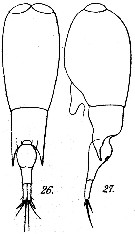 issued from : M. Dahl in Ergebnisse der Plankton-Expedition der Humboldt-Stiftung. Bd II, G. f1. I. Die Corycaeinen 1912. [Taf.XIV, Figs.26, 27]. As Corycaeus (Corycella) curtus. Female; 26, Habitus (dorsal); 27, idem (lateral left side). Non = F. orbisa after Wi & Soh, 2013 (p.1814)
|
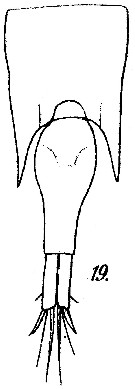 issued from : M. Dahl in Ergebnisse der Plankton-Expedition der Humboldt-Stiftung. Bd II, G. f1. I. Die Corycaeinen 1912. [Taf.XV, Fig.19]. As Corycaeus (Corycella) curtus. Female: 19, posterior part of metasome and urosome (dorsal). Non = F. orbisa after Wi & Soh, 2013 (p.1814)
|
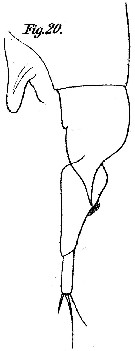 issued from : M. Dahl in Ergebnisse der Plankton-Expedition der Humboldt-Stiftung. Bd II, G. f1. I. Die Corycaeinen 1912. [Taf.XV, Fig.20]. As Corycaeus (Corycella) curtus. Female: 20, posterior part of metasome and urosome (lateral left side). Non = F. orbisa after Wi & Soh, 2013 (p.1814)
|
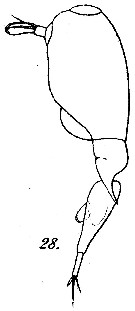 issued from : M. Dahl in Ergebnisse der Plankton-Expedition der Humboldt-Stiftung. Bd II, G. f1. I. Die Corycaeinen 1912. [Taf.XIV, Fig.28]. As Corycaeus (Corycella) curtus. Male: 28, habitus ( lateral left side). Non = F. orbisa after Wi & Soh, 2013 (p.1814)
|
 issued from : M. Dahl in Ergebnisse der Plankton-Expedition der Humboldt-Stiftung. Bd II, G. f1. I. Die Corycaeinen 1912. [Taf.XV, Fig.28]. As Corycaeus (Corycella) curtus. Male: 28, posterior part of metasome and urosome (lateral left side). Non = F. orbisa after Wi & Soh, 2013 (p.1814)
|
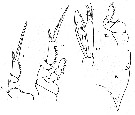 issued from : G.P. Farran in Proc. zool. Soc. Lond., 1911. [Plate X, Figs.7-11]. As Corycella curta. Female (from Christmas Island, Indian): 7, P3; 8, P2; 9, 3rd thoracic segment (mounted); 10, A2; 11, P4.
|
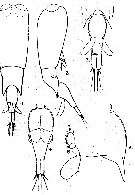 issued from : G.P. Farran in Proc. zool. Soc. Lond., 1911. [Plate XI, Figs.1-6]. As Corycella curta. Female: 1-2, habitus (dorsal and lateral, respectively, with spermatophores); 3, urosome (dorsal). Male: 4, urosome (dorsal); 5, P4; 6, 3rd thoracic segment (mounted).
|
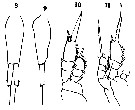 Issued from : O. Tanaka in Spec. Publs. Seto mar. biol. Lab., 10, 1960 [Pl. XXXVIII, 8-11]. As Corycaeus (Corycella) curtus. Female (from 13°44'S, 68°22'E): 8, abdomen (dorsal); 9, same (lateral); 10, P1; 11, P3 and P4. Nota: Cephalothorax and abdomen in the proportional lengths 65 to 35. 3rd thoracic segment without dorsal hump. Abdominal segment and caudal rami in the proportonal lengths 70 to 30. Genital segment slender, about 2.5 times as long as broad. Caudal rami 4 times as long as broad; the middle section of the ramus is the broadest. 2nd and 3rd exopodal segments of P1 finely serrated on the outer margin. In P2 and P3, the 3rd exopodal segment is rather coarsely serrated on the outer margin. 3rd exopodal segment of P4 is not serrated on the outer margin. According to Farran F. curta has no serration on the 3rd segment of P3.
| | | | | Ref. compl.: | | | Wilson, 1942 a (p.187); 1950 (p.228); Fagetti, 1962 (p.49); Hure & Krsinic, 1998 (p.90, 105); Khelifi-Touhami & al., 2007 (p.327, Table 1); McKinnon & al., 2008 (p.843: Tab.1); in CalCOFI regional list (MDO, Nov. 2013; M. Ohman, comm. pers.); Zakaria & al., 2016 (p.1, Table 1, Rem.); Abo-Taleb & Gharib, 2048 (p.139, Table 5, occurrence %); | | | | NZ: | 10 | | |
|
Carte de distribution de Farranula curta par zones géographiques
|
| | | | | | | | | | | | | Loc: | | | South Africa, Portugal, Medit. (Alboran Sea, Gulf of Annaba, Adriatic Sea, Ionian Sea - Cyprus, W Egyptian coast), Hurghada, Red Sea, SW Indian, Madagascar (Nosy Bé), Rodrigues Is., off S Chagos Archipelago, Christmas Is., China Seas (Luzon Strait), Japan (Honshu), California (San Pedro Bay), Australia (Great Barrier, North West Cape), Chile | | | | N: | 20 ? | | | | Lg.: | | | (34) F: 0,76; (66) F: 0,665; (327) F: 0,87-0,79; M: 0,71; (373) M: 0,77-0,71; (666) F: 0,72; M: 0,64; (669) F: 0,7; M: 0,65; (786) F: 0,74; (991) F: 0,7; M: 0,65; {F: 0,665-0,870; M: 0,640-0,770} | | | | Rem.: | Une confusion est possible entre cette espèce et F. orbisa décrite par Wi & Soh (2013, p.1814, Table 1). | | | Dernière mise à jour : 28/03/2020 | |
|
|
 Toute utilisation de ce site pour une publication sera mentionnée avec la référence suivante : Toute utilisation de ce site pour une publication sera mentionnée avec la référence suivante :
Razouls C., Desreumaux N., Kouwenberg J. et de Bovée F., 2005-2026. - Biodiversité des Copépodes planctoniques marins (morphologie, répartition géographique et données biologiques). Sorbonne Université, CNRS. Disponible sur http://copepodes.obs-banyuls.fr [Accédé le 29 janvier 2026] © copyright 2005-2026 Sorbonne Université, CNRS
|
|
 |
 |











